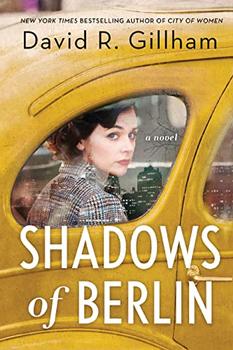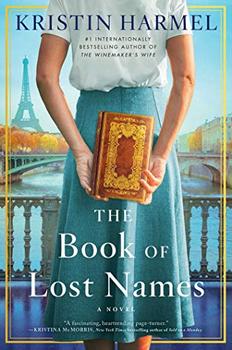Summary | Excerpt | Reading Guide | Discuss | Reviews | Beyond the book | Read-Alikes | Genres & Themes | Author Bio

A Novel
by David R. GillhamDavid R. Gillham's latest novel, Shadows of Berlin, opens in New York City in 1955. Rachel, a young Jewish woman from Berlin, has managed to avoid the horrors of Hitler's concentration camps but remains scarred by her experiences during World War II. She has married Aaron, a native New Yorker, and has tried to adopt the role of American housewife, but is unable to move beyond the guilt she feels for her actions a decade ago in Germany. The reappearance of a painting thought destroyed, a masterpiece painted by her mother, sends Rachel reeling, ultimately forcing her to come to terms with her past.
The book's premise is quite absorbing, as the author skillfully reveals Rachel's past slowly over the course of the novel. Readers learn early on, for example, that she is seeing a psychiatrist because of something referred to as the Episode, but we don't know what the Episode was for several chapters, and even then we don't understand why it happened the way it did until very late in the book. We also know that she was never subjected to the Nazis' death camps, but that her mother was, and didn't survive. Gillham expertly unfolds this tale in increments, keeping his audience spellbound until Rachel's full history is laid bare.
While these events provide the forward momentum for the plot, there's a lot more going on here than just a story of moving beyond survivor's guilt. A good deal of the narrative is about Rachel and Aaron's relationship, and about Aaron's rapport with his close-knit Jewish family. Although the third-person account is told entirely from Rachel's perspective, Aaron is illuminated through her observations of him, and the author's ability to imbue this character with so much nuance is remarkable. His rocky-yet-loving relationships with his mother, sister and cousin seem so realistic it had me reminiscing about my own family, and while he certainly has his flaws, he truly cares about his wife, even if he's frustrated by his inability to understand or help her.
The author's attention to historical detail is also a highlight. In one scene, Rachel bemoans the fact that if she wants to watch TV, she must "drag her husband down two blocks to the window of an appliance store," where there's "often a crowd when The Lone Ranger comes on, though it's hard to hear through the glass." (Aaron prefers the radio because "he likes to use his imagination.") All the characters smoke cigarettes, and Rachel pops Miltowns — a precursor of Valium — like candy. Their medicine cabinet contains Brylcreem and an aerosol can of Old Spice Smooth Shave. Being just old enough to remember these items in their heyday, these off-hand references and others like them made me smile and add tremendously to the narrative's sense of time and place.
Although I thoroughly enjoyed the novel, it had a couple of less-than-perfect elements. Sometimes I felt the dialogue drifted a bit close to caricature, and the frequent inclusion of Yiddish words and phrases added to this concern ("…a whole mishpocha of inlaws," "even here in this meshugana metropolis," etc.) On the one hand, I didn't find the conversations out of place – the speech patterns were what I'd expect, based on the movies I've seen of that time period – but I also found myself wondering if people ever really spoke that way. In short, it was a distraction rather than an enhancement. The other issue I feel compelled to mention is that the storyline regarding Rachel's past relies heavily on improbable circumstances; I wasn't particularly bothered by these scenes, but some readers may find them problematic.
Shadows of Berlin is an excellent exploration of survivor's guilt, as well as a brilliant portrayal of a marriage reaching a breaking point. I highly recommend it for most audiences, particularly those interested in Jewish culture in the United States after WWII. Book groups will find interesting topics of conversation here, too, regarding questions of family dynamics and the actions one might take in a crisis.
![]() This review was originally published in The BookBrowse Review in May 2022, and has been updated for the
February 2023 edition.
Click here to go to this issue.
This review was originally published in The BookBrowse Review in May 2022, and has been updated for the
February 2023 edition.
Click here to go to this issue.

If you liked Shadows of Berlin, try these:

by Kristin Harmel
Published 2021
Inspired by an astonishing true story from World War II, a young woman with a talent for forgery helps hundreds of Jewish children flee the Nazis in this unforgettable historical novel from the New York Times bestselling author of the "epic and heart-wrenching World War II tale" (Alyson Noel, #1 New York Times bestselling author) The Winemaker's ...

by Jennifer Rosner
Published 2021
In Poland, as World War II rages, a mother hides with her young daughter, a musical prodigy whose slightest sound may cost them their lives.
The less we know, the longer our explanations.
Click Here to find out who said this, as well as discovering other famous literary quotes!
Your guide toexceptional books
BookBrowse seeks out and recommends the best in contemporary fiction and nonfiction—books that not only engage and entertain but also deepen our understanding of ourselves and the world around us.